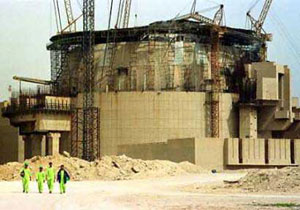

Vol. 73/No. 30 August 10, 2009

|
| Nuclear reactor in southwest Iran under construction in 2003. Washington and its allies oppose Iran’s development of nuclear technology, which Tehran says it needs to provide power. |
U.S. secretary of state Hillary Clinton, speaking in Bangkok July 22, said, “We want Iran to calculate what I think is a fair assessment, that if the United States extends a defense umbrella over the region” the Iranian government “won’t be able to intimidate and dominate, as they apparently believe they can, once they have a nuclear weapon.”
Washington has charged that Iran’s nuclear power program is aimed at producing weapons. Tehran denies this, saying the program is needed to develop the country’s infrastructure.
“Mrs. Clinton’s invocation of a defense umbrella is reminiscent of the so-called umbrella that Washington extends to its Asian allies: implicitly, the promise of an American reprisal if they are attacked by nuclear weapons,” the New York Times said July 23.
In Israel, intelligence and atomic power minister Dan Meridor told army radio, “I was not thrilled to hear the American statement from yesterday that they will protect their allies with a nuclear umbrella, as if they have already come to terms with a nuclear Iran.”
U.S. defense secretary Robert Gates flew to Israel shortly afterward and held a news conference in Jerusalem July 27 with Israeli defense minister Ehud Barak. Referring to a military strike against Iran, Barak said, “We clearly believe that no options should be removed from the table. This is our policy. We mean it. We recommend others to take the same position.”
“I think we’re in full agreement [with Tel Aviv] on the negative consequences of Iran obtaining [nuclear] capability,” Gates said.
The Obama administration has proposed to Tehran that it engage in negotiations over its nuclear program. At the news conference Gates demanded an answer from the Iranian government by late September, when the United Nations General Assembly convenes. “If the engagement process is not sufficient the U.S. is prepared to press for significant additional sanctions,” he warned. The White House has also stated that military action is not ruled out.
“Israeli officials made clear they were unhappy with the administration’s outreach to Tehran and that they wanted tougher measures,” reported the Wall Street Journal. “In his appearance with Mr. Gates, Mr. Barak said any negotiations with Iran should be ‘short in time and well-defined in objectives.’” Gates promised that Washington’s proposal for talks with Tehran was not “an open-ended offer.”
In Iran tens of thousands of young people were back on the streets of Tehran July 17. Their demonstrations to win more rights and political space have taken the form of supporting the campaign of Mir Hossein Mousavi, a former prime minister who ran for president in the June 12 election. His backers charged fraud when the government announced President Mahmoud Ahmadinejad had won the election.
In the first large protest since some 20 protesters were killed in June by government forces, tens of thousands of Mousavi supporters turned out to hear Hashemi Rafsanjani, a former president who backed Mousavi in the election, address the Friday prayer meeting. Attendance at the Friday prayer is usually dominated by government supporters.
In his speech Rafsanjani stated that Iran faces a “crisis” and that “it is necessary to regain people’s consent and restore their trust in the regime.” He called for releasing those imprisoned during the protests.
At one point the ceremony broke into rival chants, with Ahmadinejad supporters chanting “Death to America!” and “Death to Israel!” while opponents chanted “Freedom!” and “Death to the dictator!”
Division in army
The London Guardian reported that 36 Iranian army officers were arrested for trying to attend the prayer meeting to show support for Mousavi. It cited a Farsi-language Web site, Peiknet, which reported that the officers had planned to attend the Friday prayer “in their military clothes as a sign of protest against the cruel massacre of the people by the basij [paramilitary militias] and revolutionary guards.”
The next day Supreme Leader Ali Khamenei, the country’s most powerful political figure, appointed a new head of the army’s political ideology section.
Meanwhile, sharp divisions opened up among supporters of Ahmadinejad and Khamenei. A week after Ahmadinejad appointed Esfandiar Rahim Mashaie as first vice president, he was forced to accept Mashaie’s resignation. Stiff opposition to the appointment came from Ahmadinejad’s own supporters, stemming from a comment Mashaie made in 2008 that Iran is “a friend of the Israeli people.”
Khamenei sent Ahmadinejad a letter demanding he cancel Mashaie’s appointment. Three members of the cabinet walked out of a meeting July 22 when the president refused to let Mashaie go. Hundreds of conservative students who generally back Ahmadinejad demonstrated against him in Tehran July 24. Mashaie resigned that same day.
On July 25 Ahmadinejad fired his intelligence minister, who had been among the critics of Mashie’s appointment. The minister of culture, also an opponent of the appointment, resigned July 26.
Front page (for this issue) |
Home |
Text-version home